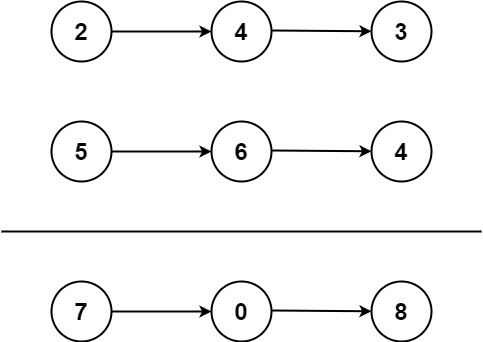Problem: You are given two non-empty linked lists representing two non-negative integers. The digits are stored in reverse order, and each of their nodes contains a single digit. Add the two numbers and return the sum as a linked list.
You may assume the two numbers do not contain any leading zero, except the number 0 itself.
Example:

Input: l1 = [2,4,3], l2 = [5,6,4] Output: [7,0,8] Explanation: 342 + 465 = 807.
Input: l1 = [0], l2 = [0] Output: [0]
Input: l1 = [9,9,9,9,9,9,9], l2 = [9,9,9,9] Output: [8,9,9,9,0,0,0,1]
Approach: It's an implementation problem, just look at the implementation to understand the approach.
Implementation in C#:
public ListNode AddTwoNumbers(ListNode l1, ListNode l2)
{
if (l1 == null || l2 == null)
{
if (l1 == null)
{
return l2;
}
return l1;
}
ListNode sumHead = new ListNode();
ListNode itr = sumHead;
int carry = 0;
while (l1 != null && l2 != null)
{
int sum = l1.val + l2.val + carry;
carry = sum / 10;
sum = sum % 10;
itr.next = new ListNode(sum);
l1 = l1.next;
l2 = l2.next;
itr = itr.next;
}
if (l1 != null)
{
this.CarrySum(l1, ref itr, ref carry);
}
else if(l2 != null)
{
this.CarrySum(l2, ref itr, ref carry);
}
if (carry != 0)
{
itr.next = new ListNode(carry);
}
return sumHead.next;
}
private void CarrySum(ListNode l, ref ListNode itr, ref int carry)
{
while (l != null && carry != 0)
{
int sum = l.val + carry;
carry = sum / 10;
sum = sum % 10;
itr.next = new ListNode(sum);
l = l.next;
itr = itr.next;
}
if (l != null)
{
itr.next = l;
}
}
Complexity: O(n)
No comments:
Post a Comment